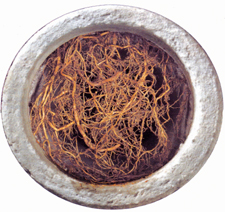


Nu Flow’s patented, cured-in-place pipe (CIPP) system creates a protective, structural pipe inside the existing host pipe system, without digging or destruction to buildings or landscape. This epoxy pipe liner creates a seamless, jointless, pipe-within-a-pipe that is used to rehabilitate deteriorating sanitary drain and storm sewer lines, including mechanical systems, with minimal disruption. Our structural lining technology is best suited for pipe 3/4 inches to 12 inches in diameter with specialty applications available for larger pipe systems.
A crucial transition has been the adoption of “inside” underground lining applications for repairs to “outside” pipes where, in the past, those repairs were managed as external trenchless repairs requiring external solutions. CIPP restoration is a non-invasive procedure that uses epoxy inside a liner to create a new pipe inside deteriorated host piping systems and can span missing sections of pipe. Epoxy pipe lining is a long-term solution for leaks and breaks, blockages, root intrusion, calcium build-up, water damage, mold, sewer backups and increases flow capacity.

Nu Flow’s patented pipe lining system is manufactured at our 16,000 square-foot manufacturing plant in Ontario, Canada. Epoxies for drain, sanitary and storm lines meet or exceed the physical properties set forth in ASTM F1743 for CIPP rehabilitation and ASTM F1216 for Inversion rehabilitation. Nu Flow’s liner enhances the structural strength of host pipe and acts as a stand-alone pipe within a pipe, meeting or exceeding ASTM D790, D638 and D543 Standards. The life expectancy of Nu Flow’s liner is over 50 years and can be installed in pipeline with diameters from 3/4 inches to 12 inches and larger.
Nu Flow’s drain and sanitary lining system has been successfully used in two primary types of applications: the ‘pull-in-place’ (PIP) method and the ’inversion’ method. Nu Flow specializes in the PIP method, where the liner is pulled into place, filled with epoxy and cured in place. The greatest advantages to the PIP method versus Inversion is the ability to line multiple 45° and 90° angles and the option of lining specific sections of pipe without lining the entire length. The other most common method of CIPP lining is Inversion, which is an alternate, less innovative technique, where the liner rolls out from the point of entry as it is filled with water, air or steam and, once cured-in-place, the end and connection points are trimmed to allow for flow.
CIPP typically requires two points of entry to place the liner; however, placement in shorter lengths of pipe is accomplished by using a push-rod system.
CIPP is inherently environmentally friendly. An enhanced wet-out process helps us reduce waste during installation. Less equipment on the job site means less energy usage and less emission
Millions of linear feet of drain and lines have been saved using the pull-in-place process. We realize every building and project is unique and Nu Flow installers have the experience and technical knowledge to meet your specific needs, regardless of the depth of the pipe or corrosive nature of the environment.
CIPP is inherently environmentally friendly. An enhanced wet-out process helps us reduce waste during installation. Less equipment on the job site means less energy usage and less emission.
Epoxy pipe lining is an eco-friendly solution that creates no waste for landfills or for recycling and generates no carbon emissions during manufacturing. Lining prevents heavy metals from leaching into drinking water and stops leaks and breaks in sanitary lines that pollute watersheds and seep pollution into groundwater. Nu Flow’s lining system leaves the smallest possible job site footprint and the shortest installation cycle of any small-diameter lining system in the industry. Our process is less disruptive, better for the environment and a better value for customers.
Most facilities/structures built prior to the early 1970s had sewer lines composed of primarily cast iron and clay. The primary problem seen in these lines is cracking and the bottom of the pipe rusting out. Common problems seen in clay pipes are root intrusion at the joints and cracks.
Common problems seen in clay pipes are root intrusion at the joints and cracks.
Root intrusion into sewer pipe systems is reported to cause 50% of all sewer blockages. Interference of trees into sewer systems is likely to occur in older systems and in cracked pipes. Factors that contribute to damage include older pipes with joints, shallow pipes, small-dimension pipes and fast-growing tree species. Cost associated with caring for root intrusion in the past has been expensive and laborious and unfortunately, is rarely a long-term fix.
Over time, calcium deposits from water form a crusted coating called ‘calcification’ which clogs up household pipes and drain lines, especially when hard water is in use. Once pipes are lined with epoxy, calcification can no longer occur because the deposits cannot adhere to the interior walls of the new epoxy barrier pipe.
Major seismic activity can cause breaks in sewer lines, but more frequently, minor seismic activity causes cracking and structural damage at the joints. The seamless, “jointless” nature of the PIP method means not only is the existing problem solved, but the new, seamless pipe will avert future problems as well.
Millions of linear feet of drain and lines have been saved using the pull-in-place process. We realize every building and project is unique and Nu Flow installers have the experience and technical knowledge to meet your specific needs, regardless of the depth of the pipe or corrosive nature of the environment.